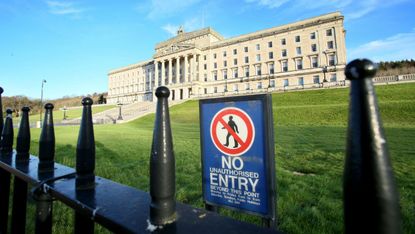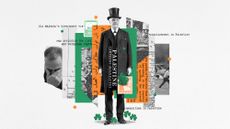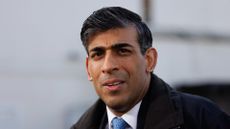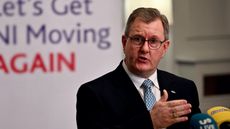What is going on at Stormont?
Unionists stage NI Assembly ‘farce’ over abortion and same-sex marriage reforms

Northern Ireland’s Stormont Assembly sat for the first time in nearly three years in a symbolic bid to block changes to its abortion and same-sex marriage laws.
Critics have described the sitting as a “farce” and a “cynical political stunt”.
So what is going on?
Subscribe to The Week
Escape your echo chamber. Get the facts behind the news, plus analysis from multiple perspectives.

Sign up for The Week's Free Newsletters
From our morning news briefing to a weekly Good News Newsletter, get the best of The Week delivered directly to your inbox.
From our morning news briefing to a weekly Good News Newsletter, get the best of The Week delivered directly to your inbox.
Why is Stormont in stalemate?
Under the power-sharing deal agreed in the Good Friday Agreement, the executive is controlled by both the main unionist party, which is the Democratic Unionist Party (DUP), and the main nationalist party, Sinn Fein.
Having secured the larger mandate at the last election, the DUP was given the post of first minister, while Sinn Fein got deputy first minister, but the two roles “are effectively a joint office, with equal power, and can only exist with the full support of the other”, says The Independent.
The newspaper adds that this arrangement “largely weathered a decade of politics”, but in November 2016, the so-called “cash for ash scandal” saw Sinn Fein leader Martin McGuinness resign as deputy first minister and the power-sharing agreement collapse.
There have been a series of talks aimed at restoring the executive but all have failed and the main chamber remains mothballed.
Why are they sitting today?
With no executive in Northern Ireland, MPs in the House of Commons in Westminster have passed some key legislation for the province. This included the decriminalisation of abortion and same-sex marriage, due to be implemented next year, unless the devolved government is restored by midnight on 21 October.
“Unionist parties, who oppose the upcoming liberalisation, triggered the recall with a petition,” says the BBC.
However, Sinn Fein refused to turn up. The Alliance Party also boycotted the meeting, with its leader Naomi Long telling RTE News that “nothing has changed” to restore power to the executive and therefore the sitting was a “farce” and a “cynical political stunt”.
What happened in the end?
Members of the Legislative Assembly (MLAs) from the Social Democratic and Labour Party (SDLP) who turned up today promptly walked out again. Leader Colum Eastwood said his party would not participate in the “stunt any longer”.
With no nationalists remaining, a speaker could not be elected and the power-sharing executive could not operate, meaning the session lasted less than an hour.
The DUP said it was not the end of the matter.
But without an executive of unionists and nationalists, “nothing can be stopped”, says Tim Stanley in The Telegraph. “The DUP will be hoist by its own petard: the United Kingdom that the DUP loves is about to force their community to become more like the rest of the country,” he says.
Create an account with the same email registered to your subscription to unlock access.
Sign up for Today's Best Articles in your inbox
A free daily email with the biggest news stories of the day – and the best features from TheWeek.com
-
 5 carefully selected cartoons about the Trump-Daniels jury selection process
5 carefully selected cartoons about the Trump-Daniels jury selection processCartoons Artists take on a stress-free life, rare peers, and more
By The Week US Published
-
 Loire Valley Lodges review: sleep, feast and revive in treetop luxury
Loire Valley Lodges review: sleep, feast and revive in treetop luxuryThe Week Recommends Forest hideaway offers chance to relax and reset in Michelin key-winning comfort
By Julia O'Driscoll, The Week UK Published
-
 Myanmar: the Spring Revolution and the downfall of the generals
Myanmar: the Spring Revolution and the downfall of the generalsTalking Point An armed protest movement has swept across the country since the elected government of Aung San Suu Kyi was overthrown in 2021
By The Week Staff Published
-
 Will Aukus pact survive a second Trump presidency?
Will Aukus pact survive a second Trump presidency?Today's Big Question US, UK and Australia seek to expand 'game-changer' defence partnership ahead of Republican's possible return to White House
By Sorcha Bradley, The Week UK Published
-
 Why is Ireland one of the most pro-Palestinian countries?
Why is Ireland one of the most pro-Palestinian countries?Today's Big Question The country has shown some of the highest support for Palestinians among white-majority nations
By Justin Klawans, The Week US Published
-
 It's the economy, Sunak: has 'Rishession' halted Tory fightback?
It's the economy, Sunak: has 'Rishession' halted Tory fightback?Today's Big Question PM's pledge to deliver economic growth is 'in tatters' as stagnation and falling living standards threaten Tory election wipeout
By Harriet Marsden, The Week UK Published
-
 Stormont power-sharing in sight: 'good news' for Northern Ireland?
Stormont power-sharing in sight: 'good news' for Northern Ireland?Talking Point Unionists vote to end two-year boycott after agreeing legislative package to address post-Brexit trading arrangements
By The Week UK Published
-
 Why your local council may be going bust
Why your local council may be going bustThe Explainer Across England, local councils are suffering from grave financial problems
By The Week UK Published
-
 Rishi Sunak and the right-wing press: heading for divorce?
Rishi Sunak and the right-wing press: heading for divorce?Talking Point The Telegraph launches 'assault' on PM just as many Tory MPs are contemplating losing their seats
By Keumars Afifi-Sabet, The Week UK Published
-
 How would a second Trump presidency affect Britain?
How would a second Trump presidency affect Britain?Today's Big Question Re-election of Republican frontrunner could threaten UK security, warns former head of secret service
By Harriet Marsden, The Week UK Published
-
 'Rwanda plan is less a deterrent and more a bluff'
'Rwanda plan is less a deterrent and more a bluff'Instant Opinion Opinion, comment and editorials of the day
By The Week UK Published